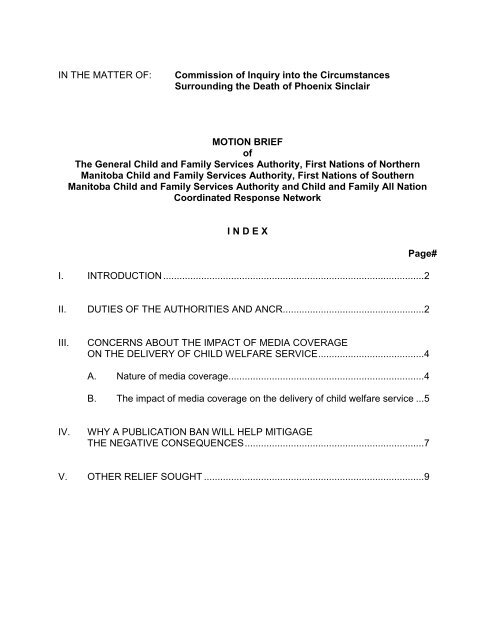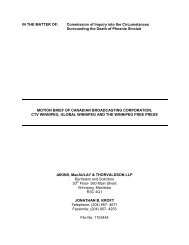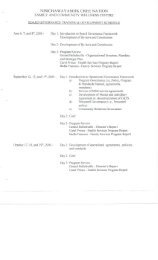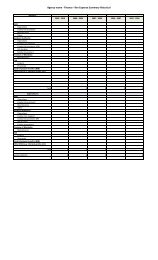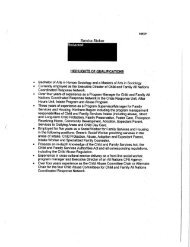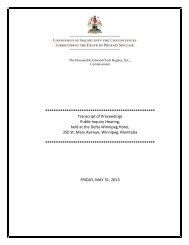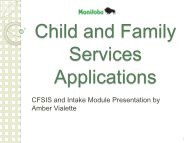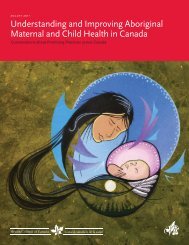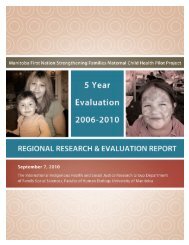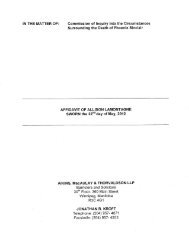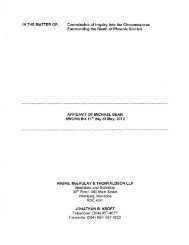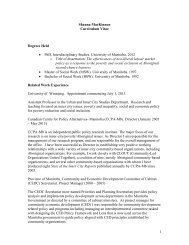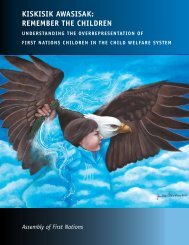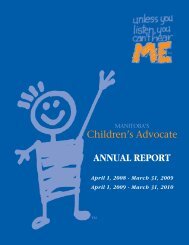Motion Brief - Phoenix Sinclair Inquiry
Motion Brief - Phoenix Sinclair Inquiry
Motion Brief - Phoenix Sinclair Inquiry
You also want an ePaper? Increase the reach of your titles
YUMPU automatically turns print PDFs into web optimized ePapers that Google loves.
IN THE MATTER OF:<br />
Commission of <strong>Inquiry</strong> into the Circumstances<br />
Surrounding the Death of <strong>Phoenix</strong> <strong>Sinclair</strong><br />
MOTION BRIEF<br />
of<br />
The General Child and Family Services Authority, First Nations of Northern<br />
Manitoba Child and Family Services Authority, First Nations of Southern<br />
Manitoba Child and Family Services Authority and Child and Family All Nation<br />
Coordinated Response Network<br />
I N D E X<br />
Page#<br />
I. INTRODUCTION ................................................................................................ 2<br />
II. DUTIES OF THE AUTHORITIES AND ANCR .................................................... 2<br />
III.<br />
CONCERNS ABOUT THE IMPACT OF MEDIA COVERAGE<br />
ON THE DELIVERY OF CHILD WELFARE SERVICE ....................................... 4<br />
A. Nature of media coverage ........................................................................ 4<br />
B. The impact of media coverage on the delivery of child welfare service ... 5<br />
IV.<br />
WHY A PUBLICATION BAN WILL HELP MITIGAGE<br />
THE NEGATIVE CONSEQUENCES .................................................................. 7<br />
V. OTHER RELIEF SOUGHT ................................................................................. 9
- 2 -<br />
I. INTRODUCTION<br />
1. The Authorities and ANCR support the <strong>Inquiry</strong> and will continue to provide full<br />
cooperation as contemplated in paragraph 8 of the Order in Council. The <strong>Inquiry</strong> is in<br />
the best interests of children and families in Manitoba. There are numerous productive<br />
facets to this <strong>Inquiry</strong>, and we believe that the end result of the <strong>Inquiry</strong> will be helpful<br />
recommendations that will result in a number of improvements to the child welfare<br />
system in Manitoba.<br />
2. However, along with these positive facets, there are certain unintended collateral<br />
consequences that have been identified by those in the field of social work which may<br />
have a detrimental impact on the child welfare system as discussed below.<br />
3. As the bodies that are ultimately responsible for child welfare in Manitoba, the<br />
Authorities and ANCR have presented affidavit evidence intended to inform the<br />
Commission of these potential negative consequences. While it is likely that some of<br />
these consequences are going to be necessary and unavoidable, the Authorities and<br />
ANCR submit that whatever can be done to mitigate the negative consequences ought<br />
to be done.<br />
4. The Authorities and ANCR submit that one method that is sure to mitigate the<br />
potential harmful aspects of the <strong>Inquiry</strong> is a publication ban on the terms set out in their<br />
Notice of <strong>Motion</strong>.<br />
II.<br />
DUTIES OF THE AUTHORITIES AND ANCR<br />
5. The Authorities are the bodies that are ultimately responsible for administering<br />
and providing for the delivery of child and family services in Manitoba. They have a<br />
number of specific duties which are set out in the legislation. These duties are<br />
specifically set out in section 19 of The Child and Family Services Authorities Act:<br />
DUTIES AND POWERS OF AUTHORITIES<br />
Duties of an authority<br />
19 Subject to the regulations, an authority must, in respect of the<br />
persons for whom it is responsible to provide services under section 17,
- 3 -<br />
(a) promote the safety, security and well-being of children and families, and<br />
protect children in need of protection;<br />
(b) develop objectives and priorities for providing child and family services<br />
consistent with provincial objectives and priorities;<br />
(c) ensure that culturally appropriate standards for services, practices and<br />
procedures are developed;<br />
(d) ensure that the standards developed under clause (c) are consistent with<br />
provincial standards, objectives and priorities;<br />
(e) ensure that the agencies it has mandated under Part I of The Child and<br />
Family Services Act provide services and follow the practices and<br />
procedures in accordance with the standards referred to in clause (c);<br />
(f) establish hiring criteria for persons to be hired to provide child and family<br />
services, and ensure that those criteria are implemented by agencies it<br />
has mandated;<br />
(g) ensure that child and family services prescribed by regulation are<br />
provided or made available, and ensure that there is reasonable access<br />
to services generally;<br />
(h) ensure that child and family services are provided<br />
(i) in a manner that is responsive to the needs of the children and families<br />
receiving the services, and<br />
(ii) where practicable, in the language in which those children and families<br />
ordinarily communicate with each other;<br />
(i) determine how funding is to be allocated among the agencies it has<br />
mandated in order to meet<br />
(i) the objectives and priorities developed by the authority, and<br />
(ii) provincial objectives and priorities;<br />
(j) cooperate with other authorities, the director and others to ensure that the<br />
delivery of child and family services in the province is properly<br />
coordinated;<br />
(k) advise the agencies it has mandated;<br />
(l) ensure the development of appropriate placement resources for children;<br />
(m) advise the minister about child and family services matters;<br />
(n) supervise or direct the supervision of children in care, and receive and<br />
disburse money payable for their care;<br />
(o) make recommendations to the director about the licensing of child care<br />
facilities other than foster homes, that are not owned and operated by an<br />
agency;<br />
(p) hear and decide appeals respecting the licensing of foster homes;<br />
(q) comply with any written directions given by the minister, and with any<br />
requirements specified in the regulations.<br />
6. Broadly stated, these provisions impose a duty upon the Authorities to ensure<br />
that the child welfare system functions in the best interest of children and families in<br />
Manitoba.
- 4 -<br />
III.<br />
CONCERNS ABOUT THE IMPACT OF MEDIA COVERAGE ON THE<br />
DELIVERY OF CHILD WELFARE SERVICE<br />
7. Based on the information contained in the affidavits of Cheryl Regehr and Bruce<br />
Rivers, the Authorities and ANCR have serious concerns about the impact of<br />
sensational media coverage of the <strong>Inquiry</strong> on the child welfare system. These concerns<br />
warrant a limited publication ban as one means of mitigating the potential negative<br />
consequences that may follow if the media is allowed to cover the <strong>Inquiry</strong> without<br />
restriction.<br />
A. Nature of media coverage<br />
8. There is an abundance of research that has been conducted on the nature of<br />
media coverage in relation to child welfare. This work has been reviewed by Cheryl<br />
Regehr and summarized in her affidavit.<br />
9. Media coverage of child death reviews often involves sensationalistic stories and<br />
reporting aimed at castigating agency personnel for allowing grievous events to unfold.<br />
Affidavit of Cheryl Regehr, paragraph 24<br />
10. Media sources are usually very critical of the agencies that are responsible for<br />
protecting children, often implying that they are not accountable. This creates a vicious<br />
circle in which the work environment becomes more restrictive, employees become<br />
angry and frustrated at what they cannot do to serve clients, and ultimately results in<br />
more media sensationalization.<br />
Affidavit of Cheryl Regehr, paragraph 32<br />
11. Media reports are not intended to record events but rather are focused on selling<br />
news. There are examples from British and Welsh media coverage that depict child<br />
welfare workers as “child stealers”, “abusers of authority, hysterical and malignant” and<br />
“motivated by zealotry rather than facts”.
- 5 -<br />
Affidavit of Cheryl Regehr, paragraph 28<br />
12. One article describes a high profile child protection case in Ireland in which<br />
media sought to mobilize “our army of outraged readers to join our crusade to have<br />
these workers kicked out of their jobs”. The same newspaper also provided contact<br />
information for social workers and threats were subsequently made.<br />
Affidavit of Cheryl Regehr, paragraph 29<br />
13. Even though phase one of the <strong>Inquiry</strong> is still months away and not a single<br />
witness has taken the stand, there have already been a number of examples of this type<br />
of sensationalistic journalism in the coverage of this <strong>Inquiry</strong>. The public‟s reaction to<br />
these stories is evidenced in the reader comments to these articles.<br />
Supplementary Affidavit of Janet Kehler, paragraphs 15-23<br />
B. The impact of media coverage on the delivery of child welfare service<br />
14. There is ample evidence to illustrate the devastating consequences the actual<br />
social workers who testify at the <strong>Inquiry</strong> will suffer as a result of the media coverage of<br />
their testimony.<br />
15. The inquiry process in itself is highly stressful, resulting in repeated exposure to<br />
highly distressing memories, criticism of their professional integrity, and a sense of<br />
isolation. The media attention is viewed by the workers involved in the <strong>Inquiry</strong> as<br />
intensifying this distress.<br />
Affidavit of Cheryl Regehr, paragraphs 12-13<br />
16. It has been observed that media reports weaken public support for child welfare<br />
services, have far reaching impacts on the personal lives of workers, and lead to<br />
workers choosing to leave the field – thereby undermining the delivery of child welfare<br />
services in general.<br />
Affidavit of Cheryl Regehr, paragraphs 13
- 6 -<br />
17. Public reviews into child deaths take their toll on child welfare staff. Following a<br />
number of public inquests involving the Toronto Children‟s Aid Society, a pattern<br />
developed whereby staff that were involved in the inquests either left the field<br />
altogether, moved out of the province, or moved into positions with less perceived risk.<br />
Affidavit of Bruce Rivers, paragraph 18<br />
18. However, the impact is not just on the social workers who have been called to<br />
testify at the inquiry. There is a clear impact on other social workers in the province,<br />
both within the agencies of the social workers testifying, as well as elsewhere.<br />
Observing what their colleagues are going through and how they are treated in the<br />
media coverage will no doubt send a chill through child protection agencies and change<br />
the decision making and risk assessment of social workers. Observing fellow workers‟<br />
faces being published with disparaging headlines will cause fear that they could be next.<br />
Social workers will err on the side of caution and as a result children may be brought<br />
into care in circumstances that do not warrant apprehension.<br />
Affidavit of Bruce Rivers, paragraph 20<br />
19. This could have a ripple effect in the system and cause an imbalance. Social<br />
workers growing aversion to taking risks and erring on the side of safety could result in<br />
a dramatic spike in the number of children admitted into care, like it did in Ontario.<br />
Affidavit of Bruce Rivers, paragraph 16<br />
20. Along with the increase in the number of children being brought into care in<br />
Ontario came a huge influx of child protection court cases and a corresponding backlog<br />
of same. This resulted in more pressure on the social workers to investigate and record<br />
every aspect of the work they were doing. This created higher workloads and<br />
consequently, less time was available for the direct provision of services to families and<br />
children.<br />
Affidavit of Bruce Rivers, paragraphs 21-22
- 7 -<br />
21. The increase in children in care also led to a shortfall in foster parents and<br />
caregivers, and difficulties in the recruitment of volunteers.<br />
Affidavit of Bruce Rivers, paragraphs 17 and 23<br />
22. As a result of the negative media attention, less people are choosing to enter the<br />
field of child protection.<br />
Affidavit of Bruce Rivers, paragraph 25<br />
Affidavit of Gwendolyn M. Gosek, paragraph 10(x)<br />
23. As a result of negative media attention, it has become increasingly difficult to<br />
retain existing child welfare staff.<br />
Affidavit of Bruce Rivers, paragraph 19<br />
Affidavit of Gwendolyn M. Gosek, paragraph 10(h)<br />
24. High turnover rates for social workers in the field of child welfare has been an<br />
ongoing concern with grave implications for children and families involved with the<br />
system, as well as child welfare agencies and government. High turnover results in<br />
frequent changes to social workers involved in individual cases, making it difficult to<br />
establish stable relationships. High turnover also impacts remaining agency workers as<br />
their caseloads get bigger to pick up the slack. It also forces inexperienced workers to<br />
be placed in situations that are beyond their level of capability.<br />
Affidavit of Gwendolyn M. Gosek, paragraph 10(i)-10(o)<br />
IV.<br />
WHY A PUBLICATION BAN WILL HELP MITIGATE THE NEGATIVE<br />
CONSEQUENCES<br />
25. It is submitted that a publication ban on the identities of social workers will reduce<br />
the risk of the aforementioned negative consequences of the media coverage of this<br />
<strong>Inquiry</strong>. Prohibiting the publication of the names and faces of social workers testifying<br />
will reduce the sensationalistic aspect of media coverage, which is in large part a cause<br />
of the problem.
- 8 -<br />
Balancing the deleterious effect of restricting media coverage against the risk of<br />
negative impacts on the delivery of child welfare services<br />
26. A plethora of evidence as to the possible negative impact of extensive and<br />
sensational media coverage of this <strong>Inquiry</strong> has been adduced. The evidence reveals a<br />
risk to the child welfare system, and therefore a risk to the children of Manitoba. This<br />
risk must be minimized with reasonable restrictions being imposed on media coverage.<br />
27. Balancing the deleterious effect of media coverage on child protection work<br />
against the deleterious effect of restricting media coverage, it is clear that the restriction<br />
of the media coverage is the „lesser of the two evils”.<br />
28. No evidence has been adduced to show that reporting the names and images of<br />
CFS workers is necessary or even important in order to effectively communicate the<br />
news of what is occurring at the <strong>Inquiry</strong>. There is no purpose whatsoever that is<br />
advanced by revealing the identities of the social workers other than to sensationalize<br />
the story and sell news.<br />
29. Moreover, no evidence has yet been adduced to suggest that the child welfare<br />
system would be improved by reporting the names and images of CFS workers who<br />
provided services to <strong>Phoenix</strong> <strong>Sinclair</strong> and her family. Quality assurance and<br />
accountability processes are in place in the child protection system. If there is a<br />
deficiency in this regard, the <strong>Inquiry</strong> will identify it and recommend ways to fix the<br />
problem.<br />
30. It is important to remember that no social worker will escape scrutiny where it is<br />
warranted after the Commission has received and considered all of the facts of this<br />
case. Furthermore, each worker that testifies will be in the hearing room for all present<br />
to see and hear. The witness‟s involvement in the matter will be the subject of intense<br />
examination by numerous lawyers. The media will be free to report on what was said at<br />
the hearing in terms of the questions and answers without any restriction whatsoever.
- 9 -<br />
31. The restrictions requested herein will not negatively impact media coverage; but<br />
they will reduce the likelihood of sensationalistic coverage and thus reduce the potential<br />
negative effects on the system described by Cheryl Regehr and Bruce Rivers, among<br />
others.<br />
32. For these reasons, the publication ban sought with respect to social workers<br />
testifying at the <strong>Inquiry</strong> is in the best interests of the children of Manitoba.<br />
V. OTHER RELIEF SOUGHT<br />
33. The Authorities and ANCR are also seeking a publication ban with respect to the<br />
identities of sources of referral/informants, as well as any individual who is testifying<br />
about services they received from child and family services.<br />
34. The Authorities and ANCR are also seeking redaction of documents and<br />
transcripts in accordance with the Commissioner‟s Ruling on Redaction.<br />
35. The Authorities adopt the submissions made by the MGEU, ICFS and SOR #5<br />
an #6 in support of these requests. These parties have made ample and cogent<br />
arguments in support of this relief.<br />
36. Lastly, the Authorities and ANCR ask that the Commission allow Cheryl Regehr<br />
and Bruce Rivers to file supplemental affidavits for the sole purpose of confirming that<br />
their March 30, 2012 affidavits were filed in support of the within motion and are<br />
applicable to the other publication ban motions.<br />
37. These affidavits are relevant to the issues on the motions and thus are helpful to<br />
the fulfilling of the Commission‟s mandate. As such, they ought to be considered by the<br />
Commissioner in the course of his deliberations.
- 10 -<br />
38. Moreover, Rule 14 of the Commission‟s Amended Rules of Practice and<br />
Procedure allows the Commissioner to receive any evidence he considers helpful to<br />
fulfilling his mandate whether or not such evidence is admissible in a court of law.<br />
ALL OF WHICH IS RESPECTFULLY SUBMITTED this 11 th day of April, 2012.<br />
_____________________________________<br />
HAROLD COCHRANE / KRIS SAXBERG /<br />
LUKE BERNAS<br />
D‟ARCY & DEACON LLP<br />
Barristers and Solicitors<br />
2200 – One Lombard Place<br />
Winnipeg, MB R3B 0X7<br />
Telephone: 204-942-2271
IN THE MATTER OF:<br />
Commission of <strong>Inquiry</strong> into the Circumstances<br />
Surrounding the Death of <strong>Phoenix</strong> <strong>Sinclair</strong><br />
______________________________________________________________________<br />
MOTION BRIEF<br />
of<br />
The General Child and Family Services Authority, First Nations of Northern<br />
Manitoba Child and Family Services Authority, First Nations of Southern<br />
Manitoba Child and Family Services Authority and Child and Family All Nation<br />
Coordinated Response Network<br />
______________________________________________________________________<br />
D'ARCY & DEACON LLP<br />
Barristers and Solicitors<br />
2200 – One Lombard Place<br />
Winnipeg, Manitoba<br />
R3B 0X7<br />
HAROLD COCHRANE / KRIS SAXBERG/ LUKE BERNAS<br />
Telephone: 204-942-2271<br />
Facsimile: 204-943-4242<br />
Our File No. 116822 0001


